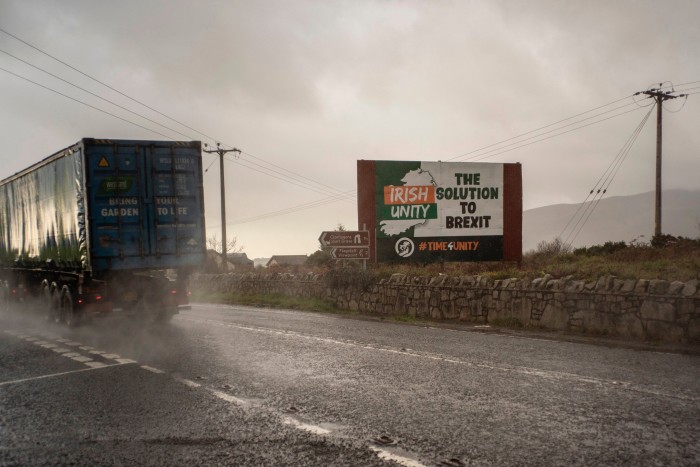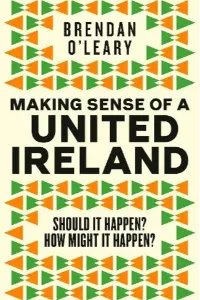A united Eire? Completely different views on a shifting political panorama

It’s not new for Leo Varadkar to put on his coronary heart on his sleeve in terms of the polarising query of Irish reunification. The chief of Eire’s centre-right High quality Gael get together, who is ready to return subsequent weekend to the workplace of Taoiseach, prime minister, has stated he’s proud to aspire to the objective, and needs to see it delivered in his lifetime.
However addressing a 5,000-strong crowd at a latest convention organised by a pro-unity advocacy group, Eire’s Future, Varadkar did one thing uncommon: he fleshed out element about the way it is likely to be realised, similar to protecting Northern Eire’s establishments inside a reunited island.
Varadkar’s remarks are a small illustration of a broader shift within the political panorama throughout the island of Eire. Simply over a century after partition, conventional standpoints and allegiances are being challenged by quite a lot of elements, together with demographic change, the results of Brexit and the rise of Sinn Féin, a nationalist get together that has recast itself as a progressive motion alert to the social and financial considerations of a youthful technology.
The query of unification has undeniably risen up the political agenda. Much less clear is what the reply is likely to be. Opinion polls present robust assist within the republic for the rose-tinted prospect of reuniting the island, although there are additionally considerations concerning the prices this may entail; in Northern Eire that is still a minority curiosity, with simply over 1 / 4 wanting unity however half wanting to stay within the UK.
Even these in favour of what Varadkar referred to as the “noble and legit aspiration” of unification are typically gentle on the element of how this is likely to be realised. That is very true for followers of Sinn Féin, the most well-liked get together each north and south of the border.

In opposition to this backdrop, Making Sense of a United Eire by Brendan O’Leary is a welcome and compelling learn, one among a wealthy crop of recent titles that tackle the difficulty of unification from quite a lot of angles and which collectively present complementing insights into how and from the place change may come.
O’Leary, a professor on the College of Pennsylvania and one among Eire’s most prestigious political scientists, addresses the exhausting questions head on, together with easy methods to maintain a (not Brexit-style) referendum; how a lot a united Ireland would value; what financial advantages unity may convey; who would pay Northern Irish pensions; and the nitty-gritty of how the newly enlarged entity may really be ruled.
Varadkar instructed that Northern Eire may preserve cross-community power-sharing, its personal courts, schooling system, police and well being service — just below Irish, moderately than British, sovereignty — and that issues may “evolve and deepen in time”.
O’Leary argues that such a transitional answer may result in inefficient duplications and lift but extra questions. He doesn’t declare to have all of the solutions, and at occasions appears overly optimistic — similar to his advice to determine a authorities fund to finance the transition to a united Eire when a extra urgent concern for most individuals within the Republic is a deep housing crisis. However he combs by the sensible and emotional hurdles to reunification with thought-provoking thoroughness.
Varadkar returns to the submit of Taoiseach on December 17 underneath a deal agreed between High quality Gael and Fianna Fáil, the 2 historic behemoths of Irish politics, in coalition with the Inexperienced get together. That adopted an election in 2020 by which Sinn Féin gained probably the most first-preference votes however was unable to type a authorities.
Below the management of Mary Lou McDonald, Sinn Féin has reinvented itself because the get together of change moderately than the mouthpiece of the republican paramilitary IRA in the course of the Troubles in Northern Eire. McDonald is now tipped by many to turn into Taoiseach after the subsequent common election, due by early 2025.
With that in thoughts, Shane Ross seeks to penetrate the official narrative from a secretive get together identified for its inflexible grip on messaging in his unauthorised biography, Mary Lou McDonald: A Republican Riddle. In it, he charts “Challenge Mary Lou” — McDonald’s rise as handpicked successor to Sinn Féin’s veteran former chief Gerry Adams, and her drive to make the “small get together with a darkish previous and a uncertain future” she inherited electable and the automobile to ship unification.

Among the many questions Ross, a former unbiased minister, pursues are why it took so lengthy for a privately educated, middle-class woman from Dublin, raised by her mom after her “out-of-work, out-of-sight” father left the household when she was 10, to transform from a Fianna Fáil supporter to ardent republican by the age of 30. McDonald says she was impressed by the IRA starvation strikes of the early Eighties, when she was 12.
One other line of inquiry results in that central function of Irish life immediately: housing. Particularly, the query of how McDonald and her husband paid for intensive renovation of their north Dublin home. “There may be nothing to counsel that Mary Lou has ever been concerned in something untoward or has been apart from an individual of impeccable monetary integrity,” writes Ross, “however she ruthlessly calls for transparency of others.”
His questions concerning the couple’s home led to the specter of authorized motion from McDonald’s husband, however Ross maintains {that a} politician who made a reputation as “fearless, refreshingly probing and unimpressed by vested pursuits” whereas serving on the general public accounts committee within the Dáil parliament can not duck troublesome questions herself.
Ross goes on to problem McDonald’s convictions and willingness to defend Adams and the get together line, tartly describing her in his vigorous account as having proven herself occasionally not “as Adams’ protégée as however his house-trained poodle”. But he notes “a consistency about her want for a united Eire” — one thing she says may occur earlier than the top of the last decade. Ross, nevertheless, nonetheless seems to harbour doubts about whether or not the “nakedly formidable” politician is an opportunist.
As O’Leary, who helps unity, argues, nevertheless, reunification “mustn’t occur as a result of Sinn Féin advocates it”. For a united Eire to succeed it should be a “multi-party” mission, not simply that of a celebration, Sinn Féin, that’s deeply distrusted by many each north and south of the border.
The difficulties concerned in securing such broad assist are underscored in Geoffrey Bell’s The Twilight of Unionism. Bell, a Belfast-born author on Eire and British attitudes to the Troubles, who’s a pro-unity Labour activist, gives a portrait of a neighborhood in political and demographic decline — however which can be important to the success of any future reunification, whereas having “little to supply however echoes of the drumbeats of the previous”. Though much less nuanced than Susan McKay’s acclaimed Northern Protestants: On Shifting Floor (2021) and generally slowed down in an excessive amount of element, Bell makes a strong if sombre case that there isn’t any finish in sight to “division, prejudice and inequality” in a future united state.

O’Leary is extra even-handed. He delves into the element however boils all of it all the way down to easy questions concerning the relative efficiency of the south versus the north and expectations for a way post-Brexit buying and selling preparations, the so-called Northern Ireland Protocol that left the area contained in the EU’s single marketplace for items, will play out.
“Will the Republic of Eire, on common, proceed to get richer than the UK?” he asks. “Will Northern Eire profit from the protocol and can that ease its doable future convergence into the higher-growth economic system of the remainder of the island? . . . Will the Brexit experiment show as damaging to the UK’s long-run financial efficiency as at present instructed by most credible economists?” In O’Leary’s judgment, the reply to those questions is sure. However he goes on to concede that “eight years is a very long time in economics in addition to politics”.
And the protocol — which Varadkar helped to recover from the road in non-public talks with the then UK prime minister Boris Johnson in 2019 — is far from settled. Northern Eire’s largest pro-UK get together, the Democratic Unionist Get together, has paralysed the area’s power-sharing political establishments since Might due to its opposition to it, and January is shaping as much as be crunch time.

Because the EU and UK try to reconcile their variations over the protocol, the Irish Occasions journalist Stephen Collins has written a taut aide-memoire of the machinations that delivered a deal which Northern Eire’s as soon as dominant unionist neighborhood is refusing to swallow. Eire’s Name supplies useful historic context and fascinating navigation of Brexit as seen from an Irish perspective. Sadly, he swerves the query of what’s going to occur subsequent.
Varadkar can be spending the subsequent two years forward of the election attempting to include the rise of Sinn Féin, whereas selling his personal views of a united Eire as a worthy trigger. “What’s previous is prologue,” he stated this week at an official commemoration of the creation of the Irish Free State in 1922. “The occasions of 100 years in the past ought to encourage us to dream of what may be achieved within the years forward.”
The increasing library of books on the topic means that realising that dream can be something however simple.
Making Sense of a United Ireland by Brendan O’Leary, Sandycove £20, 384 pages
Mary Lou McDonald: A Republican Riddle by Shane Ross, Atlantic Books £16.99, 396 pages
The Twilight of Unionism: Ulster and the Way forward for Northern Eire by Geoffrey Bell, Verso £14.99, 221 pages
Ireland’s Call: Navigating Brexit by Stephen Collins, Crimson Stripe Press £16.99, 265 pages
Jude Webber is the FT’s Eire correspondent
Be a part of our on-line e-book group on Fb at FT Books Café
Source link
